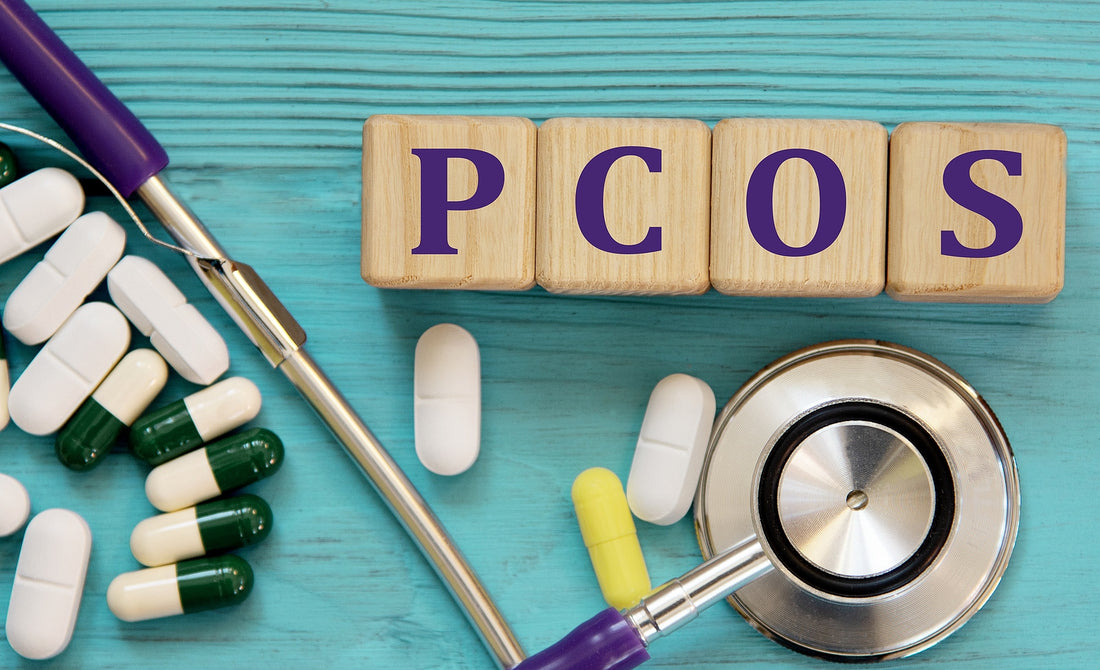It’s that time of the month again… or is it?
Usually around this time you start to get cramps, feel a bit more bloated, crave sweet or salty things, and head to the store to make sure you have supplies.
But this time, nothing happens.
You wait a few days, but still nothing.
Here we go again, you sigh.
Soon, you experience sharp pains around your ovaries. The acne on your chin is still there, and you noticed a new patch of hair on your arm. If you’re like some women, it may be PCOS.
It’s a real drag, but you’re not sure what you can do about it.
Dealing with PCOS can be complicated. In this article, we’ll help you make sense of it all.
And after you’re through, you’ll be filled with a sense of hope that PCOS doesn’t have to run your life.
What is PCOS?
Polycystic ovary syndrome (PCOS) is an increasingly common hormone disorder affecting more than 20% of women of child-bearing age (1).
One of the key characteristics about PCOS is the excess amount of androgen hormones produced by the ovaries. Androgens are hormones that help with creating red blood cells, developing muscle, keeping bones dense, puberty, and sexual desire (3). It’s produced in the testicles, ovaries, and the adrenal glands and helps your body mature physically.
The problems begin when your body starts to release too many of these hormones. When this happens on a chronic level, your body can no longer function properly.
Complications
Because it’s a hormonal issue, PCOS can affect a variety of other health functions. No one knows exactly what the cause is, but certain risk factors such as insulin resistance and obesity can increase your likelihood of developing PCOS (4).
Not only can this create discomfort and pain in the body, it can also increase your risk for developing depression, anxiety, or even obsessive compulsive disorder (8).
Symptoms of PCOS
While everyone has a different experience, some of the most common symptoms (2) of PCOS include:
- Extended, prolonged or irregular periods
- Painful cysts on ovaries
- Infertility
- Body hair on chest, back, arms, or face
- Thinning hair or baldness
- Excess oily skin
- Weight gain, especially around the abdomen
- Skin tags under arms or on neck
How is PCOS Diagnosed?
If you’re concerned that something isn’t quite right, talk with a healthcare professional. Together, you can create an actionable plan.
But how do they diagnose PCOS? While there’s no one way to diagnose it, there are a few key areas (7) physicians will test and examine in order to determine your condition.
These areas can include:
- Adrenal hyperplasia, when your adrenals produce too much hormone
- Thyroid gland issues, whether they’re producing too much or too little hormone
- Hyperprolactinemia, when the pituitary gland in your brain produces too much prolactin hormone
Your physician may also ask about your family history, run blood samples, do a physical exam, or take an ultrasound of your pelvic area. They may also ask about your symptoms, when they started and how severe or frequent they are.
Treatment Options
Can you get rid of PCOS? Current research suggests there is no cure, but symptoms can be managed.
Because it’s a hormone imbalance, some treatment options include birth control (5). Low doses of estrogen are thought to help reduce the effects of the androgens. Other medications may help with hair thinning, excessively oily skin, or infertility.
The other treatment option is to get to the root of the issue by addressing the hormone imbalance itself. This can be tricky, but incorporating a lifestyle change by replacing processed foods with more fruits and vegetables, fish, fiber, and whole grains can help correct insulin resistance levels (6).
Focusing on healthy weight loss and stress management systems can also help improve symptoms.
Conclusion
Hormones play a crucial role in regulating everyday body functions. And when one area is off-kilter, it can negatively affect the rest of your body.
Roughly 1 in every 4 women within the child-bearing age struggle with polycystic ovary syndrome. This hormone disorder is famous for its overproduction of androgen hormones, which can lead to missed periods, painful ovarian cysts, acne, body hair, and more.
It can be physically, emotionally and socially taxing for someone to deal with PCOS on a regular basis. Feelings of embarrassment or shame can lead to isolation, unhealthy eating habits, and possible substance abuse.
There are medications on the market to help address PCOS, but research is still ongoing. Working with a certified functional medicine nutritionist or physician can help you develop a game plan that includes adopting an anti-inflammatory diet, enjoying appropriate exercise, and positive stress management strategies.
PCOS may be complicated, but it doesn’t have to run your life. Do you know someone who’s dealing with PCOS? Share the love by letting them know you care. And feel to share this article in your social circle!
References & Disclaimers
1. https://pubmed.ncbi.nlm.nih.gov/24591680/
2. https://www.hopkinsmedicine.org/health/conditions-and-diseases/polycystic-ovary-syndrome-pcos
3. https://my.clevelandclinic.org/health/articles/22002-androgens
4. https://www.ncbi.nlm.nih.gov/pmc/articles/PMC3277302/
5. https://www.nhs.uk/conditions/polycystic-ovary-syndrome-pcos/treatment/
7. https://www.nichd.nih.gov/health/topics/pcos/conditioninfo/diagnose
8. https://pubmed.ncbi.nlm.nih.gov/30066285/
✝✝This noted statement is based on independent research and is not necessarily the opinion of the author
